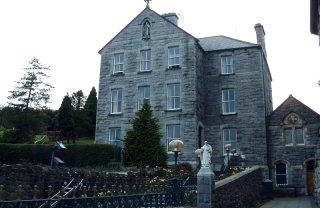The Russells of Dominic Street in the nineteenth century had a privileged childhood. Although well-off they were still unpampered and unspoilt. Of the five surviving children, all three girls became Sisters of Mercy one of the two boys became a Jesuit priest and the other, Charles a famous lawyer and eventually Lord Chief Justice of
Matthew (later the Jesuit) asserted that few children of their social standing had fewer toys and less pocket money than they did. However holidays in Killowen, to which they moved permanently in 1838 provided ample opportunities for fun and play. Swimming, boating on Carlingford Lough, scampering up mountains, frequent visits from friends and relatives, trips, picnics and horse riding more than compensated for lack of toys. Seven years later on the death of their father, they moved back to Newry.
Sundays were Holy Days – Mass, devotions, bible reading – no unnecessary work. Weekdays were rounds of lessons from their talented live-in governess who provided a rich and varied curriculum for children so young – English, History (English, Roman, Grecian), French, Botany, Natural Philosophy, Astronomy, Music and Drawing. As they matured, Art, Singing, Dancing and Riding lessons were added as a refining process. Management skills were developed at an early age. Each girl had her turn – a week at a time – in running the house and had charge of ‘the keys’. The virtues of determination, solidarity and dependability were inculcated; also truth, loyalty, trust, responsibility, obedience and discipline. Prayer and work completed their day and before ever entering the convent the girls had completed their novitiate, and Charles his apprenticeship to the law.
The story of Kate (Sister Baptist) in
